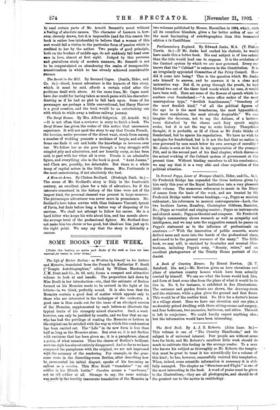• •
Par/iamentary England. By Edward Jenks, MA. (T. Fisher Unwin. 5s.)—If Mr. Jenks had curbed his rhetoric, he would have Made this a better book. His real subject is of legs extent than the title Would lead one to suppose. It is the evolution of the Cabinet system' by which we are now governed. Every ono 'knows that the " Cabinet" is 'unknown to the Constitution: • It is an irregularly appointed "Committee of the Privy Council. How did it come into being ? This is the question which Mr. Jenks .sets himself to answer; and he answers it in a clear and instructive way. But if, in going through the proofs, he had blotted two out of the three hard words which he uses, it would have been well. Here are some of the flowers of speech which he scatters over Sunderland :—" A mere office seeker of the ,most unscrupulous type," "devilish heartlessness," "treachery of the most fiendish kind," "of all the political figures of the age he is the most treacherous, the most hypocritical, the most scandalous, the most utterly despicable." We can imagine the decorum, not to say the dulness, of a lecture- room disturbed by the cheers such fiery speech might evoke, but it is not the way to write history. Thucydidos thought, it is probable, as ill of Cleon as Mr Jenks thinks of Sunderland, but he spires his superlatives. We have no wish to apologise for Sunderland, but is it not the fact that no nation is ever governed by men much below its own average of morality ? Mr. Jenks is seen at his best in his appreciation of the younger Pitt, and in the second part of his final chapter, which discusses the actual working of the Cabinet system of government at the present time. Without binding ourselves to all his conclusions, we may say that it is a very able and clear exposition of the political situation.


























































 Previous page
Previous page